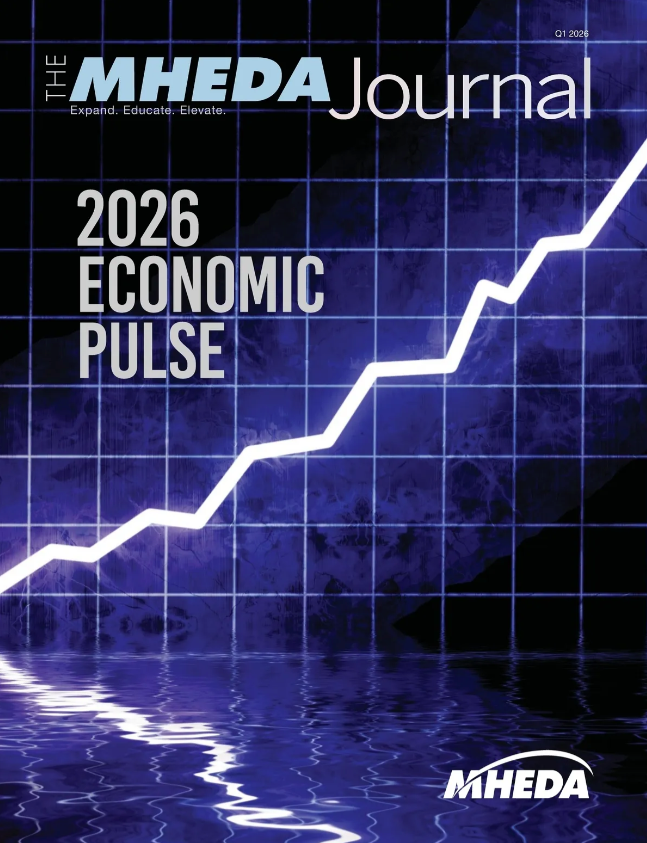AI is at the forefront of innovation, and it’s not slowing down anytime soon.
By Nicole Needles
ARTIFICIAL INTELLIGENCE (AI) is at the forefront of technological innovation, reshaping industries and redefining human potential. Zack Kass will be one of the many amazing speakers featured at the 2025 MHEDA Convention. Kass is an AI futurist and former Head of Go To Market at OpenAI, has been instrumental in this transformative journey. He has spent over 14 years in the field of AI with companies like Figure Eight, Lilt and OpenAI. His goal is to ensure AI is accessible and understandable for everyone and to help those at the forefront of businesses and government entities feel empowered to navigate it. At OpenAI, Zack worked to turn the company’s research into tangible and practical information that businesses can use. He is now considered one of the most prominent thought leaders in AI.
Kass’s journey into the world of AI began because of his interest in how humans and technologies are not adversaries but on the same team.
“I’ve always been fascinated by technology that expands human potential,” he reflects. “AI isn’t just about efficiency – it’s about imagination.” This perspective underscores AI’s role not merely as a tool for automation but as a catalyst for human creativity and problem-solving.
Transformative Developments
At OpenAI, Kass witnessed groundbreaking advancements, notably the development of transformer models. “The transformer model rewrote the playbook,” he explains. “It turned language into a universal interface, unlocking applications from creative writing to scientific discovery.” This innovation has paved the way for AI systems capable of understanding and generating human-like text, revolutionizing fields such as natural language processing and machine translation.
Reshaping Industries
AI’s influence extends across various sectors, with healthcare, finance and manufacturing poised for significant transformation.
– Healthcare: AI is set to make personalized medicine more accessible by democratizing diagnosis and drug discovery. By analyzing expansive datasets, AI can identify patterns and predict outcomes, leading to improved patient care and operational efficiency. Studies indicate that AI integration could lead to substantial cost savings in healthcare, potentially reducing spending by 5 to 10%, equating to approximately $200 billion to $360 billion annually (Source: National Bureau of Economic Research).
– Finance: In the financial sector, AI enhances decision-making processes and accessibility to credit. By assessing risk more accurately and detecting fraudulent activities, AI contributes to a more secure and efficient financial ecosystem. The implementation of AI in financial services has led to improved risk management and customer service, fostering greater trust and reliability.
– Manufacturing: AI enables the development of smarter factories and optimized supply chains, minimizing waste and boosting efficiency. By predicting maintenance needs and optimizing production schedules, AI helps manufacturers reduce downtime and operational costs. The integration of AI in manufacturing processes has resulted in significant improvements in productivity and product quality.
– Education: Kass envisions AI having a profound impact on education. “Personalized learning for every student – that’s the dream,” he envisions. “To prepare, we must invest in accessible infrastructure and effective tools.” AI-powered educational platforms can tailor learning experiences to individual needs, enhancing engagement and outcomes. The integration of AI in education promises to bridge gaps and provide equitable learning opportunities worldwide.
Balancing Innovation
and Ethical Considerations
As AI continues to evolve, its impact on the workforce is a subject of considerable discussion. Kass emphasizes the importance of upskilling employees to work alongside AI technologies.
“Invest in people as much as technology,” he advises. “Pair AI with human ingenuity to elevate creativity and problem solving.” This approach ensures that while AI handles repetitive tasks, humans can focus on strategic and creative endeavors, leading to a more fulfilling work environment.
The ethical implications of AI are at the forefront of many of these discussions. Kass advocates for transparency and alignment with human values.
“AI should work for us, not against us,” he asserts. “Transparency in decision making and safeguards against misuse are paramount.”
Ensuring that AI systems are explainable and free from biases is crucial to prevent unintended consequences and maintain public trust.
During his tenure at OpenAI, Kass encountered the additional challenge of balancing ambition with responsibility.
“Getting ethical considerations right required iterative collaboration with researchers and policymakers,” he reveals. This collaborative approach is essential to navigate the complex landscape of AI development and deployment responsibly. Although it took a few additional steps, having these expert voices in the process helped ensure that lines and precedents were clear when developing this technology.
Maximizing Potential
For companies and entrepreneurs looking to integrate AI, Kass recommends a thoughtful and proactive approach.
“Start small, experiment and scale based on tangible results,” he advises. “Focus on solving real problems rather than chasing buzzwords.”
This strategy enables organizations to harness AI effectively, driving innovation and maintaining a competitive edge. Another practical way to take small steps to incorporate AI into your business is to ask employees what a few pain points are in their daily operations. From there, consider and brainstorm solutions for how AI can be used to alleviate these stressors.
A Human-centric Future
Kass reflects on the broader implications of AI’s increasingly apparent permanence.
“As AI advances, we may redefine our purpose in a world where machines handle many tasks,” he says. “This could herald an age of enhanced humanity – more creative, compassionate and capable.”
By embracing AI thoughtfully, society can leverage its benefits to foster a future where technology and humanity coexist harmoniously, enhancing the quality of life.
Zack Kass’s insights illuminate a future where AI serves as a powerful ally in expanding human potential. By focusing on ethical considerations, investing in human capital and adopting AI strategically, we can navigate the complexities of this technological revolution. The journey ahead promises a symbiotic relationship between humans and AI, leading to unprecedented advancements and a more equitable society.
Article Takeaways
1. AI as a Catalyst for Human Creativity. Zack Kass emphasizes that AI’s true potential lies in augmenting human creativity and solving complex problems, from drug discovery to energy storage.
2. Industries Poised for Transformation. AI will revolutionize healthcare with personalized medicine, enhance financial decision-making and create smarter, more efficient manufacturing systems.
3. Ethical and Strategic Integration. To harness AI’s potential responsibly, businesses must prioritize transparency, invest in workforce upskilling and adopt AI technologies strategically to solve real-world problems.
Article Sources
1. National Bureau of Economic Research. “The Potential Impact of Artificial Intelligence on Health Care Spending.” Available at: www.nber.org/books-and-chapters/economicsartificial-intelligence-health-carechallenges/potential-impact-artificialintelligence-health-care-spending
2. Zack Kass official website. “About Zack Kass.” Available at: zackkass.com




